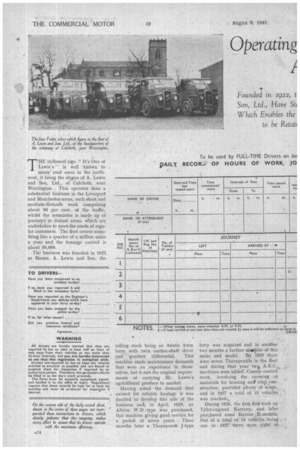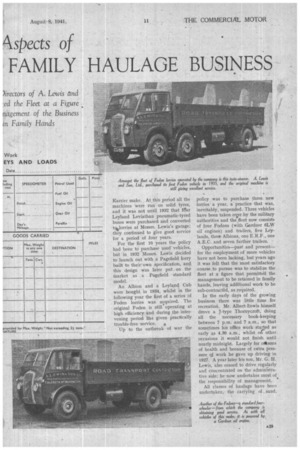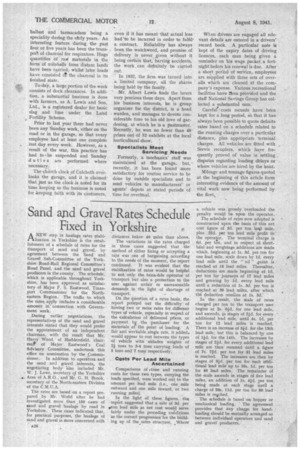Operating
Page 26

Page 27

Page 28

If you've noticed an error in this article please click here to report it so we can fix it.
Aspects of •
FAMILY HAULAGE BUSINESS
Founded in 1922, Son, Ltd., Have Sic Which Enables the
)irectors of A. Lewis and ;ed the Fleet at a Figure nagement of the Business in Family Hands
to be Retail
THE tailboard sign '-' It's One of Lewis's' is well known. to many' toad users in the northwest, it being the slogan of A. Lewis and Son, Ltd., of Culcheth, near Warrington. This operator does a substantial business in the Liverpoci and Manchester areas, such short and meditut-distanee _ work comprising about 90 per cent. of the traffic, whilst the remainder is made up of journeys to distant areas, Which are undertaken to meet the needs of regular customers. The fleet covers something like a quarter of a million miles a year and the tonnage carried is about 50,000.
The business was founded in 1922 as Messrs. A. Lewis and Son, the rolling stock being an Anstin 3-ton lorry with twin cardan-shaft drive and 'gearbox differential. This machine made maintenance demands that were an experience in themselves, but it met the original requirements of carrying Mr. Lewis's agriciiltural produce to market.
Having noted the demand .that existed for reliable haulage it was decided to develop this side of the business and, in April, 1923, an Albion W.D.-type was purchased, this'machine giving good service for a period of seven years. Three months later a Thornycroft J-type
lorry was acquired and in another two months a further machine of this . make and model. By 1925 there were seven Thornycrofts in the fleet and during -that year twi. A.E.C. _ machines were added. County council' work, involving the carrying of materials for housing an roalil_construction,. proNqded plenty of scope, and in 1927 a total of 15 vehicles was reached._
During 1926, the firth first took up Tylor-engined Karriers, and laier purchased some Karrier K-models. Out of a total of 15 'vehicles 'being run in 1927 there Were eight of Harrier make. At this period all the machines were run on solid tyres, and it was not until 1932 that few Leyland Leviathan pneumatic-tyred buses were purchased and converted tcblorries at Messrs. Lewis's garage; they continued to give good service for a period of four years.
For the first 10 years the policy had been to purchase used vehicles, but in 1932 Messrs. Lewis decided to launch out with a Pagefield lorry built to their own specification, and this design was later put on the market as a Pagefield standard model.
An Albion and a Leyland Cub were bought in 1934, whilst in the following year the first of a series of Foden lorries was acquired. The original Foden is still operating at high efficiency and during the intervening period has given practically
trouble-free service. a
Up to the outbreak of war the policy was to purchase three, new lorries a year, a practice that was, inevitably, suspended. Three vehicles have been taken over by the military authorities and the fleet now consists of four Fodens (with Gardner 6LW oil engines) and trailers, five Leylands, thret Albions, one E.R.F., one A.E.C. and seven further trailers.
Opportunities—past and present— for the employment of more vehicles have not been lacking, 'but years ago it was felt that the most satisfactory course .to pursue was to stabilize the fleet at a figure that permitted the management to be retained in family hands, leaving additional work to be sub-contracted, as required.
In the early days of the growing business there was little time for recreation. Mr. Albert Lewis himself drove a J-type Thornycroft, doing all the necessary book-keeping between 7 p.m. and 7 a.m., so that sometimes his office work staled as early as 4.30 a.m., whilst oi other, occasions it would not finish until nearly midnight. Largely for reasons of health and because of extra pressure oi work he gave up driving in 1927. A year later -his son, Mr. G. H. Lewis, also ceased to drive regularly and concentrated on the administrative side; he now undertakes most of the responsibility of management.
All classes of haulage have been undertaken, the carrying of. sand, ballast and tarmacadam being a speciality during the early years.An interesting feature during the past four or five years has been the transpoft of charcoal for respirators. Huge quantities of raw materials in the form of nutshells from distant lands have been carried, whilst later loads have consisted ot the charcoal in its finished state.
To-day, a large portion of the work consists of dock clearances. In addition, a substantial business is done with farmers, as A. Lewis and Son. Ltd., is a registered dealer for basic slag and lime under the Land Fertility Scheme.
Prior to last year there had never been any Sunday work, either on the road or in the garage, so that every employee had at least one complete rest day every week. However, as a result of the war, this practice has had to be suspended and Sunday duties are performed where necessary,.
The chtirch clock of Culcheth overlooks the garage, and it is claimed' that just as the clock is noted for its time keeping so the business is noted for keeping faith with its customers, even if it has meant that actual loss ' had to be incurred in order to fulfil' a contract. Reliability has always
been the watchword, and promise of delivery is never. given. without it being certain that, barring accidents, the work can definitely be Carried out.
In 1932, the firm was turned into a limited company, all the shares being held by the family.
Mr. Albert Lewis finds the hours very precious these days. Apart from
his business interests, he is group organizer for the district, is a head warden, and manages to devote considerable time to his old love of gardening, at which he is a pastmaster. Recently, he won no fewer than 48. prizes out of 52 exhibits at the local horticultural show. "
Specialists Meet Servicing Needs
Formerly, a mechanics' staff was maintained at the garage, but, • recently, it has been found more satisfactory for routine service to be done by outside specialists and to send vehicles to manufacturers' or agents' depots at stated periods of time for overlraul.
When drivers are engaged all relevant details are entered in a drivers' record book. A particular note is kept of the expiry dates of driving licences, each man being given a reminder on his wage packet., a fortnight before his renewal is due. After a short period of service, employees are supplied with three sets of overalls which are cleaned at the company's expense. Various recreational facilities have titen provided and the staff National Savings Group has collected a substantial sum. Careful.. costs records have been kept for a long period, so that it has always been possible to quote definite rates based on a schedule related to the running charges over a particular distance, plus appropriate terminal charges. All vehicles are fitted with Servis recorders, which have frequently proved of value in settling disputes regarding loading delays or where vehicles are hired by the hour.
Mileage and tonnage figures quoted at the beginning of this article form -interesting evidence of the amount of vital work now being performed by the fleet.




















































